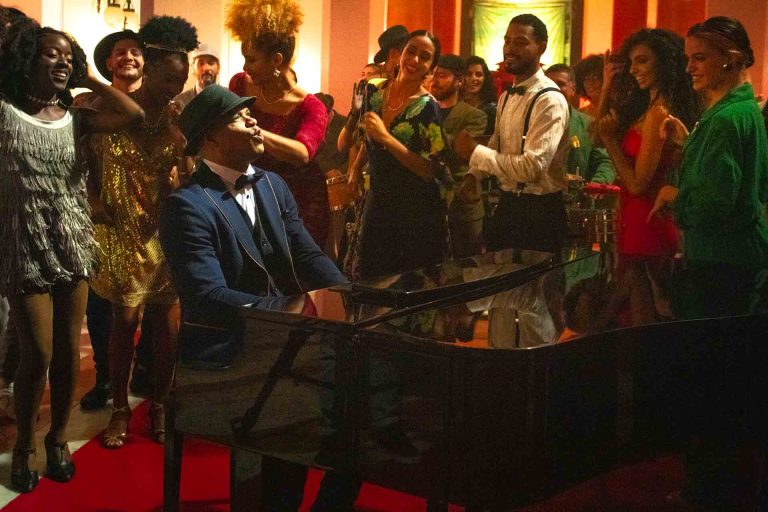
Cubanissimo à la Français
06 February, 2024The First Lady, a former actress turned therapist, remarked on “how nice it was to see a theatre full” on the evening of the first day of February. As someone who has harboured ambitions of writing for the stage, I had to agree.
The Théatre de Brive was indeed packed. And why wouldn’t it be for one of the concluding events of the 2024 Bleu en Hiver jazz festival: a double header of poly-rhythmic Cuban music featuring the cellist Ana Carla Maza, followed by Roberto Fonseca’s La Gran Diversión? What’s more, the municipal worthies of Brive la Gaillarde decreed that the former should be an early-evening free concert, while the latter was priced very reasonably for an artist of such stature. So where, one wondered, looking around an auditorium seemingly filled with people of a similar “certain age”, were the younger generations?
But enough preamble already! Ana Carla Maza started with the kind of flourish that underlined her classical training, before launching into the repertoire that she and her two accompanists, German pianist Norman Peplow and Guadeloupian drummer Arnaud Dolmen, were here to perform: a ride through the rhythms of the Caribbean taken from the Cuban-born cellist’s third album, Caribe. My own image of a cellist derives perhaps from the film Hilary And Jackie, a biopic of the tragic British cellist Jacqueline du Pré, in other words a bit of a seated slave to the cumbersome instrument. But Ana Carla Maza defies stereotypes: she plucks, she bows, she lays the big fiddle down to dance and exhort the audience to participate, and she even wields the cello at times like an electric guitar. What’s more, as her album had already served to emphasise – she sings. Wonderfully. Both band-mates played on Caribe and it showed. Together they ran through the range of Caribbean and Latin rhythms with dexterity and rapport – merengue, cumbia, son, tango, even reggae – fuelled by the cellist’s energy and the brilliant kit work of Arnaud Dolmen, whose tasteful drumming was a revelation.
Ana Carla Maza clearly loves to perform. Such enthusiasm is infectious: the audience wouldn’t let her go, but even when their collective energy was beginning to flag, the star of the show just didn’t want to stop, reprising several times the descarga section of the first single from the album, “A Tomar Café”. Based now in Paris, it’s clearly her years in Havana that define her as an artist.
While certainly not outstaying her welcome, she played appreciably longer than her allocated time. Which meant of course that Roberto Fonseca started later than the normally clockwork schedule. How could he possibly top the kind of performance that had the First Lady and I mouthing at times to each other a simple “wow!”? The answer was that he and his seven cohorts resoundingly could. Starting with the video that announced the album that came out around the same time as Caribe, La Gran Diversión, the pianist’s tribute to the music of his native Cuba’s past and probably his most personal album to date, we followed the two-tone shoes as they stepped out of the old-fashioned limousine, walked up the steps and into the auditorium before the same shoes, the same suit and the same familiar hat appeared on stage. From start to encore, it was the “great fun” that the album’s title promised.
I’d seen Roberto Fonseca quite a few years back in a more pure jazz context at the annual summer jazz festival at Souillac, and while he was every bit as brilliant as you would expect such a talent to be, La Gran Diversión underlines that it’s the music of his native Cuba that courses through his veins, too. I’ve noted before that Fonseca is an artist who just loves to mambo and in the company of such an able band – two saxes, a trumpet, double bass, drums, percussion plus the thrilling voice of the young singer, Carlos Calunga – mambo he did. Variety, though, was the spice of the show: there was a moving tribute to the pianist’s old playmates in the Buena Vista Social Club, with some lovely projected photographs of Ibrahim Ferrer, Omara Portuondo, Rubén Gonzales et al; a scintillating duet between Fonseca and his brilliant percussionist, Andrés Coayo; and an interlude that featured the band sitting around a candle-lit table on which Coayo beat with his palms, fists and elbows while the band added melody and further percussion. Everyone had his individual feature and the band hugged each soloist in turn and huddled after the encore in a demonstration of mutual respect and affection. A well-oiled outfit, to be sure.
Roberto Fonseca also spends much of his time now in France. In 2019, a grateful nation awarded him the title of Chevalier of the Order of Arts and Letters. He speaks French well, but his heavy Spanish inflections made it hard to follow the details of the various tales he spun throughout a brilliant show. But it was evident nevertheless that he is both maestro and entertainer. He has played before in tandem with Ana Carla Maza in recent times and the common denominator seems to be the kind of joie de vivre that we westerners often appear to lack. On the first day of February, we felt it vicariously in spades from both artists. Enough to wonder wistfully whether we should arise and go now to Havana, Cuba.
Follow Sounds and Colours: Facebook / Twitter / Instagram / Mixcloud / Soundcloud / Bandcamp
Subscribe to the Sounds and Colours Newsletter for regular updates, news and competitions bringing the best of Latin American culture direct to your Inbox.

